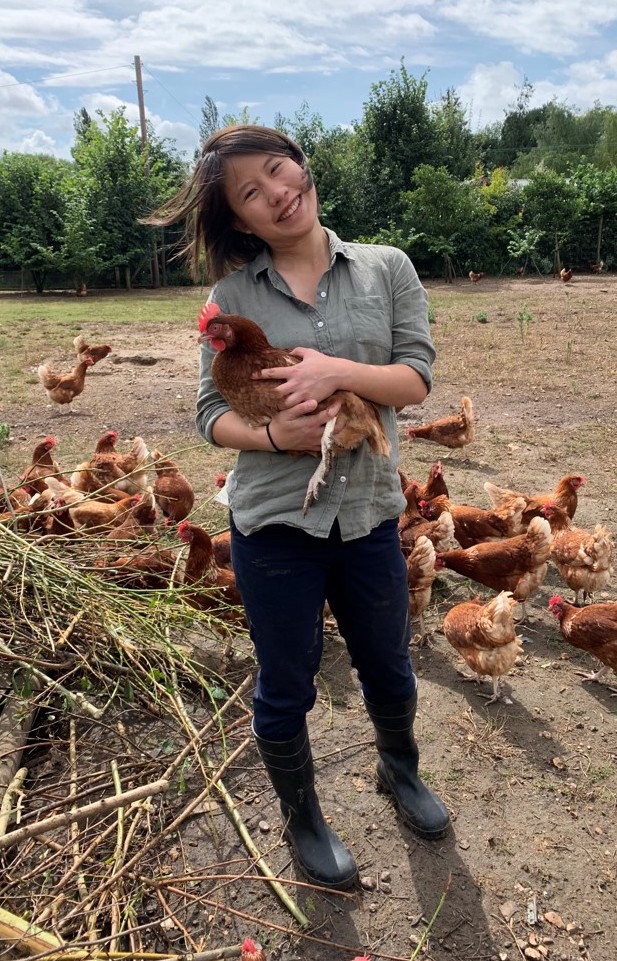
A number of AWP students, alumni and collaborators, come from the veterinary community. In honour of International Day of Veterinary Medicine on December 9th, we would like to introduce you to one of our current Masters students (and Doctor of Veterinary Medicine), Hui Pin (Julia) Lee. Learn about her interests in veterinary medicine and how that relates to her current research in animal welfare.
How did you first get interested in animal welfare?
I chose to pursue a veterinary degree simply to save animals. This was the only career path I knew where I could gain knowledge and skills to help animals. However, after being introduced to the term ‘animal welfare ’in my first year of vet school, the way I perceived human-animal relationships shifted significantly. I began to think about animals as beings with emotions, needs, and desires that may be influenced by, but independent from, human activities. Coupled with ethical dilemmas I encountered on farms (e.g., tail docking for piglets), in college (e.g., animals for dissections) and in practice (e.g., breeding brachycephalic dogs), I realized there are many more problems animals suffer from beyond biological functioning. These concerns are especially apparent with farm animals where they are primarily bred, fed, raised, and slaughtered for food. It is logistically impossible to provide individual care to ten thousand laying hens when you’re the only person present on the farm. I needed to take a step back from proactive veterinary interventions to better understand and appreciate what animals really need. This is when I started attending events hosted by the RVC student animal welfare society, and later became the president of this society. Besides learning about animal welfare issues, I hoped to build this community where students are encouraged to safeguard and improve animal welfare.
How did these early experiences prepare you for your research today?
Growing up in China before studying in the UK made me appreciate cultural complexity much more than before. This reflection upon my own experiences gradually evolved into an interest in farm culture: what are the roles of animals, people, and the environment in constructing the unique culture on each farm? What are the experiences of animals and humans living in this cohabiting space? How is ‘good’ practice defined and implemented?
My initial research plan was to conduct ethnographies on cage-free layer farms in China to investigate the perceptions of humans and hens in those settings. However, this project became unfeasible due to strict covid travel restrictions in China. Another lesson I’ve learned throughout the years is to be adaptable, so I shifted from farm-based research to online-based research focusing on cage-free egg consumers. Instead of directly observing laying hens, this new project explores consumer perception of eggs produced by layers living in cage-free farms. I took another step back from farm animals to better understand how their interests compare and compete with other priorities in the market, such as price, food safety, and taste.
Why did you join the AWP?
My close friend and colleague, Maria Chen, introduced me to Professor Dan Weary and the AWP during my last year in vet school. At that time, I was struggling with planning my career. I wanted to take a break from medicine and approach farm animal welfare issues from a different angle. Exploring different positions and cities is part of my nature, so the opportunity to spend two years as a researcher in Vancouver immediately became the next goal in my life. The warm invitations from Professor Dan and Maria also made me feel extremely welcome in the AWP community, even before I joined.
What do you find satisfying/interesting about your research/career?
The most satisfying part of my research is to communicate knowledge and construct meanings. I am always excited to listen to the stories my participants share with me about their last visit to a free-range layer farm, or how they prepared breakfast for their children/spouse. Through analyzing these transcripts and constructing the meanings of cage-free eggs from the consumers ’perspectives, I feel more empowered to communicate these values and priorities with other stakeholders, such as egg producers and retailers. Acknowledging that my research fills a significant knowledge gap in the cage-free egg industry in China motivates me every day. I hope to communicate the values of consumers and find opportunities where their priorities match those of the animals.